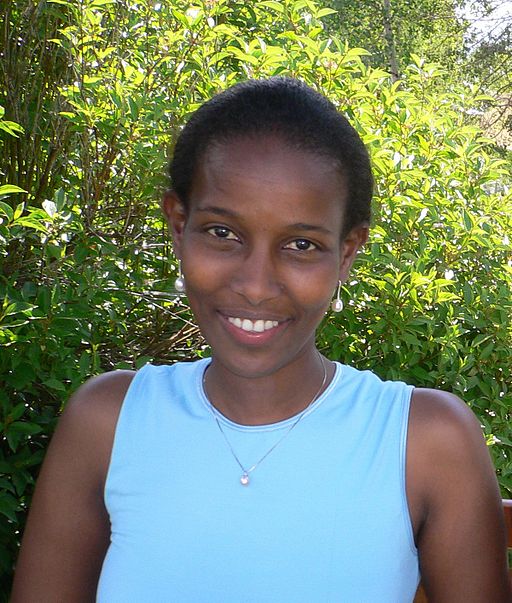Following her first contribution to this column a few weeks ago, today’s guest column is once again written by Sarah Jones, Communications Associate for Americans United for Separation of Church and State. The views expressed in this piece belong to Jones and do not necessarily reflect those of her employer.

Ayaan Hirsi Ali in 2006. Photo by Steve Jurvetson, via Wikimedia Commons.
Controversy over Ayaan Hirsi Ali’s rescinded Brandeis honorary doctorate continues to roil certain corners of the atheist world, with many framing it as an unforgivable insult to a prominent women’s rights activist.
The reality is a bit more complicated. Although it’s undeniable that Hirsi Ali experienced horrific violence, her crusade for women’s rights seems to have transformed over the years into a crusade against Islam.
Her detractors—myself included—have pointed out that she supports a Western conquest of Islam, believes that Muslims should be converted to Christianity, and has blamed multiculturalists for being “advocates of silence” that drove Anders Breivik to slaughter seventy-seven people, most of them children.
Any rational observer should be able to acknowledge that many of her statements are prejudiced. Yet that seems to be one step too far for some atheists, who point to Hirsi Ali’s early experiences with Islam as justification for her views.
But that argument is simply indefensible. One person’s individual experience with Islam, traumatic and awful as it may have been, cannot and should not outweigh the perspectives of progressive Muslims who use Islam’s precepts to fight for LGBTQ (lesbian, gay, bisexual, transgender, and queer) rights, gender equity, and racial justice in their own communities.
This is not an observation I make lightly. I too am an ex-fundamentalist; I grew up in a version of Christianity shaped by misogyny, homophobia and other forms of prejudice. I can’t overstate the psychological damage I sustained from these teachings. I’ve seen enough banal cruelty couched in religious language to last a lifetime.
But my experience with Christianity is not definitive. It took me years to be able to acknowledge that, yet acknowledge it I must. After all, I strive to be a rationalist. I am interested in the truth.
And this is the truth: Islam and Christianity do not have monopolies on sexism. I’ve been threatened and abused too many times by atheist men to believe this—and, often, I’ve received sexist abuse precisely because I’ve spoken up about Islamophobia among atheists.
If you’re willing to ignore the structural inequalities in your own community in order to point the finger at someone else’s, I have to wonder why that is. I have to wonder if your goal is to promote reason or simply to score points. I have to wonder why you need to diminish the good work of progressive people of faith to make your point.
I believe we should question everything. If I didn’t, I’d be trapped in a patriarchal marriage. I certainly wouldn’t have two higher degrees and a career fighting for church-state separation.
But if we’re going to agree that we should ask questions, we should apply the same philosophy to our own movement.
In an editorial for the New York Times, journalist Nesrine Malik argued that the Hirsi Ali controversy had revealed a deep hypocrisy among her supporters:
Had Ms. Hirsi Ali been a widely acknowledged homophobe, or white supremacist, would free speech supporters have rushed so readily to their lecterns to defend her? Probably not, which is why the right to offend should be extended to all. Otherwise, our personal preferences will always dictate that there be exceptions.
I can publicly denounce the views of Westboro Baptist Church while still endorsing their right to freedom of speech. There’s no reason the same standard shouldn’t be applied to a woman who called a religion with 1.6 billion diverse adherents a “nihilistic cult of death.”
And if you think that’s an extreme analogy, let me remind you of a few facts. According to the FBI, American Jews and Muslims are disproportionately more likely than atheists to become the victims of hate crimes. In the last thirty days, shots have been fired at mosques in two states, an imam with no criminal record was forcibly removed from a flight, a Muslim community center in Montreal was vandalized with an axe that read “we will scalp Muslims,” and in New York City a man spit on a 15-year-old girl, threatened her life, and called her a terrorist while others on the bus watched and laughed.
American atheists are certainly subjected to anti-atheist sentiment. But the consequences of that sentiment aren’t nearly as violent as they are for American Muslims.
As for public distrust—a statistic that some atheists make much of—a closer look at the 2012 Gallup poll the claim is based on reveals that Americans are least likely to vote for atheist and Muslim political candidates. The two groups are in a statistical dead heat, given the margin of error.
In a social climate like this, Hirsi Ali’s prejudice isn’t merely offensive—it’s potentially dangerous.
Please defend her right to speak. But you should also denounce her views for what they are: hateful. Any other position amounts to apologetics for prejudice—and there’s nothing rational about that.
Sarah Jones is the Communications Associate for Americans United for Separation of Church and State. Prior to joining AU, she volunteered for Femin Ijtihad, where she researched Islamic law and women’s rights. She holds a Master of Arts in Postcolonial Culture and Global Policy from Goldsmiths, University of London, and tweets at @onesarahjones. The views expressed in this piece belong to Jones and do not necessarily reflect those of her employer.





